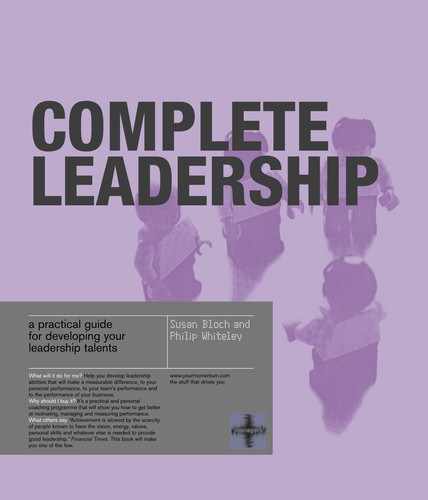
We return to the subject of coaching in Chapter 6.
‘If only . . .’ and ‘I should . . .’
It is well established in psychological study that humans display a
capacity for irrational beliefs that can hold us back; beliefs that often
it’s yours to sort out or leave.” She was most directive. At a time that I wanted some
tender loving care she gave me a kick up the backside. She said, “Your boss is an
executive and is a major shareholder; and his shareholders are on his back. It is tough,
but make your choices work for you.”
‘Since 2000 we have started to pull away significantly. By the end of 2000 we had
grown by 40 per cent, and in 2001 we grew by a further 25 per cent in a market with
declining margins. We took £15m of costs out. I learned more in nine months than I
probably would have learned in five years as managing director in easier times. Once I
was out of the difficult period I could become strategic and forward-looking. I attacked
the business issues/opportunities much more quickly than would have been the case.
I had gained a level of confidence by knowing that if I could turn things around from
those complex problems then anything else in business is just a matter of prioritizing.
‘By mid-2000 we had a new business structure. We took layers of management out,
streamlined operational efficiency, and improved service to the customer. We took
debt down by 40 per cent in the year. Market share improved by 4 percentage points,
despite the fact that the RAC [a major national breakdown service provider] entered
the market, and so did Ford via its Kwik-Fit acquisition. In 2001 we recorded our
highest staff satisfaction result in the history of Autoglass.
‘Once I had the business moving again, I didn’t see as much of my coach. I felt that all
I needed was a phone call every three months. Coaching is about being honest with
yourself and your coach. Using the expert mechanisms that she can provide to
understand your strengths and weaknesses. If you are not honest you will never get
anything out of it.’
take the form of internal voices instructing us. We can re-indoctrinate
ourselves as adults with these, according to Windy Dryden, professor
of counselling at Goldsmiths College London. She says:
‘Irrational beliefs are evaluations of personal significance stated
in absolute terms such as ‘must’, ‘should’, ‘ought’ and ‘have to’.
They are rigid, illogical, inconsistent with reality and self- and
other-defeating. It is noted that people often change their
desires into demands.’
11
As well as the ‘shoulds’ in our minds, we often have ‘if onlys’ which
similarly reflect our beliefs about the ingredients for success, but are
disabling because we are putting our faith in luck. Some examples of
those that are common in executives include:
◆ ‘If only I’d gone to Yale/Cambridge.’
◆ ‘If only I’d been born with charisma.’
◆ ‘Why should I change? I’ve done well enough up until now.’
◆ ‘I can’t change now I’m over 40.’
Ever thought one of those? It would be surprising if you haven’t.
They are typical of the myths that can arise with surprising,
unspoken force in our society. Whether they come from the
Protestant work ethic, the Cold War, or our grandparents’ experience
in the Great Depression is a matter for enquiry that would take us
beyond the limits of this practical book. The point is to acknowledge
them; to recognize that they are not all negative – generally they tell
us that it is good to achieve and to have ambitions – but to recognize
also that they can hold us back.
Let’s take each one in turn.
‘If only I’d gone to Yale/Cambridge.’
In a recent article, the management thinker Henry Mintzberg
identified the most admired chief executives of recent corporate
momentum complete leadership chapter two
35
pages 34 /

history in North America. The shortlist was perfectly predictable:
Jack Welch, Andy Grove, Bill Gates and Bob Galvin. Then he made a
comment about their qualifications. None of them had an MBA, and
two of them had actually dropped out of college.
The human brain is the most advanced, versatile, adaptable and
improvable entity in the biological world. It can recover from poor
schooling, from bullying, even from substance abuse. But it thrives
on continual exercise, a good diet, stimulus and challenge. We accept
the need to go to the gym to exercise our bodies, but can sometimes
neglect our minds. When did we last do mental arithmetic, learn a
foreign language or read New Scientist? Anyone can become smarter
than they currently are, and the truth is that we don’t know just how
smart we can become. That is a tremendously exciting thought.
Those who passed a difficult entrance examination at age 18 for a
prestigious university are doubtless well endowed with the grey
matter, but they could be letting it go stale through failing to set
themselves enough challenges, or through drinking too much, for
example.
Once we enter the corporate world we tend to be on more or less the
same playing field. If you are in a senior position, the likelihood is
that you deserve to be there. You have the abilities.
‘If only I’d been born with charisma.’
This is one of the most dangerous tripwires for the potentially
complete leader. We all know someone who was surrounded by
acolytes from a young age, who just had to hint that he or she
wanted a party and their house was full, who attract people by their
charm to work for them. They seem to lead quite naturally, and can
be successful (though intriguingly, not always). Especially when we
Anyone can become smarter than they currently are,
and the truth is that we don’t know just how smart we
can become.
are young, such individuals can provoke powerful feelings of
inadequacy when we compare ourselves with them.
Charisma simply means the ability to attract people and their
attention. Research on leadership does not identify this as a key
attribute in itself, although it can strengthen the authoritative style
(see page 47). Magnetic personalities may have many attributes, but
they may lack some too. When the business writer Jim Collins
researched the best performing US companies in the past 30 years
he listed 11 companies which had outperformed GE over that time.
All of them had rather unsexy images, and all were headed by
‘anonymous insiders’.
12
True leadership comes from a rich blend of
attributes, and the ability to draw a crowd is not the most important.
One attribute of some charismatic individuals is the ability to create
a good press, which says little about a person’s ability to lead an
organization. Not only is it of limited use to the company, it can
tempt the individual to neglect his or her personal development in
more important leadership qualities.
The unique gift of people with great charisma is to attract people and
enthuse them to work towards a goal. This is only useful if it is
unaccompanied by bullying, and if the goal makes sense for all the
people involved. Complete leadership involves a much wider range
of abilities, as we’ll see throughout this book.
‘Why should I change? I’ve done well enough up until now.’
‘I can’t change now I’m over 40.’
There is a strong belief in many of us that we can’t change what we
are and how we behave. Change is often not even a considered
option. This belief is deep-rooted, and even more so if you have been
successful. The natural rhetorical question that arises in our minds is,
‘Why should I change what I’m doing when I’ve done well enough
up until now?’
There are problems with this attitude, however. Firstly, it is simply
not true that we can’t change: how did we manage to move beyond
momentum complete leadership chapter two
37
pages 36 /
high-school levels of ability and self-awareness without changing?
Secondly, moving to an executive post introduces formidable new
challenges which are met by developing both analytical and
interpersonal skills, as the case studies throughout this book
illustrate. Thirdly, even if we have strong powers as a top executive,
and a track record of success: why put a cap on further ambitions by
pretending there is no scope for improvement?
The key question to ask yourself is: ‘Are there some habits or
behaviours that, if I were to do more or less of them, would enable
me to be even more successful?’ For example, if you raised your self-
awareness, and understood the impact you had on others, you could
then decide which behaviours or habits you might wish to change.
Why then – even after you have made a decision about something
about yourself that you would like to change and you know it would
be really valuable to you if you did change it – is it so hard to make
those changes? We’ll discuss this matter more in Chapter 6, but for
now it is illustrative to reflect on both the possibility and the
difficulties of personal change and development.
For example, Gillian, the regional head of a large manufacturing
business who was based in Peru, had participated in 360-degree
appraisal every year for five years. The feedback was consistently the
same. She was seen as charismatic, energetic, decisive and visionary.
But there were also comments every year that she did not listen. Why
was it only now that she had decided that she needed coaching to help
her to learn how to listen? Why had she not bothered to do anything
about it for the five years previously? She is highly intelligent, and
knew that such development was key to her future success. In Gillian’s
case, the possibility of moving into the chief operating officer role made
her sit up and realize that she might not get it if she did not change.
So, is change only possible if we receive awkward feedback, or if we
miss the promotion we wanted, or if we are made redundant? Is it
possible to want to change and strengthen our emotional competencies
even if we are doing really well and are seen as highly successful?
..................Content has been hidden....................
You can't read the all page of ebook, please click here login for view all page.
